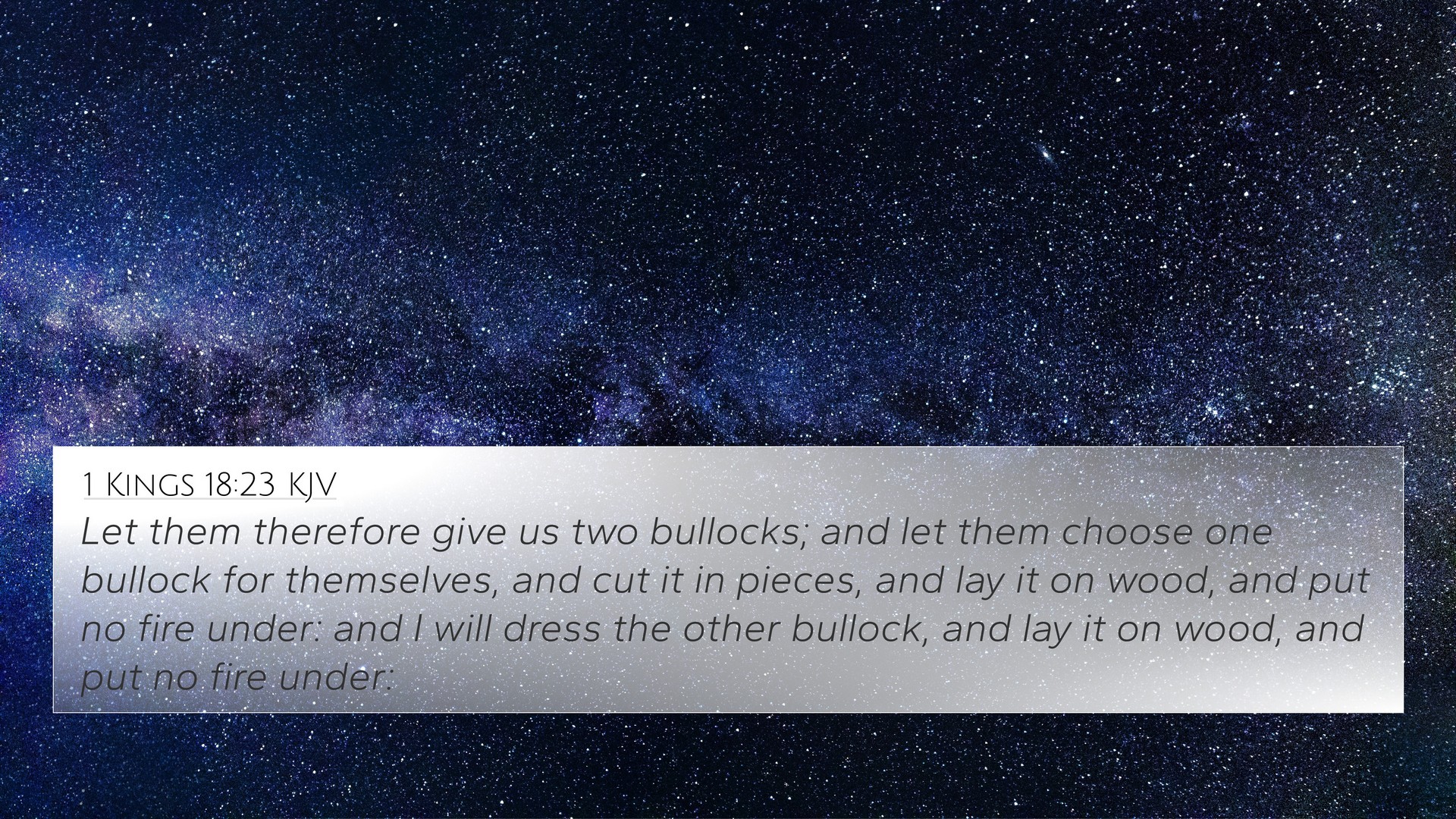Understanding 1 Kings 18:23
1 Kings 18:23: "Let them therefore give us two bullocks; and let them choose one bullock for themselves, and cut it in pieces, and lay it on wood, and put no fire under: and I will dress the other bullock, and lay it on wood, and put no fire under."
Contextual Background
This verse occurs during the dramatic confrontation between the prophet Elijah and the prophets of Baal on Mount Carmel. Elijah challenges the Israelites to decide between worshiping God and the false god Baal, setting the stage for a test of divine power.
Commentary Insights
Elijah’s Proposition
Matthew Henry emphasizes the significance of Elijah's proposition as a direct challenge to the idolatry that pervaded Israel at the time. The choice of bullocks and the method of sacrifice illustrates not only the seriousness of worship but also the crucial step in demonstrating God's sovereignty.
Albert Barnes points out that the act of cutting the bullock into pieces symbolizes the seriousness with which God’s prophets have to approach the worship of Yahweh. It serves as a physical demonstration of dedication, contrasting the empty rituals of Baal worship.
Adam Clarke highlights that Elijah's instructions are meant to leave no doubt in the hearts of the people regarding the authenticity and power of the true God, as the conditions are firmly established that neither party will use fire, allowing God’s active intervention to be clearly evident.
Thematic Connections
This verse underscores the themes of faithfulness, divine power, and judgment. It serves as a pivotal moment where the truth of God’s presence is sought in stark contrast to false worship.
Bible Verse Cross-References
- Exodus 22:29 - Instructions about offering the firstborn.
- Leviticus 1:3-9 - Details on the burnt offering, illustrating proper sacrifice.
- 1 Kings 18:30-38 - The continuation of the contest and God's powerful response.
- Matthew 5:16 - Letting your light shine, relating to public displays of divine truth.
- Romans 12:1 - Presenting our bodies as living sacrifices, mirroring the sacrificial act.
- James 1:6 - The nature of faith and doubt, parallels to the people's response during Elijah's challenge.
- Hebrews 11:6 - The necessity of faith in pleasing God, relevant to the test of faith on Mount Carmel.
Comparative Analysis
By cross-referencing 1 Kings 18:23 with passages in other books, we notice a consistent theme of choosing whom to serve. This reflects a recurring challenge found throughout the Old and New Testaments, urging believers to make a decisive choice for God over idolatry.
Instructional Insights
The verse serves as a powerful teaching tool for understanding the nature of true worship versus false worship. Through the methodical approach of sacrifice, the people are led to consider the true nature of their faith and the identity of their God.
Practical Applications
In modern contexts, this narrative invites reflection on what constitutes true worship in our lives today. It challenges believers to examine their priorities and to ensure that their devotion centers on the One true God, as opposed to the 'Baal' figures of contemporary society, which may draw their allegiance away from God.
Tools for Bible Cross-Referencing
- Bible Concordance - Easily find related scripture verses.
- Bible Cross-Reference Guide - Systems that aid in linking verses together for deeper study.
- Cross-Reference Bible Study - Methods to explore thematic connections throughout Scripture.
- Bible Reference Resources - Comprehensive tools for in-depth scripture exploration.
Encouragement to Engage with Scripture
Studying passages like 1 Kings 18:23 offers an opportunity for deeper spiritual growth. By employing cross-referencing methods, readers can uncover layers of meaning, draw parallels between diverse scriptural contexts, and cultivate a robust understanding of faith.
Conclusion
The challenge posed by Elijah in 1 Kings 18:23 resonates with us today. It serves as a reminder to choose wisely whom we serve, recognizing the powerful implications of our decisions. As we explore and examine the connections between Bible verses, we strengthen our faith and understanding, allowing Scripture to guide us in our spiritual journey.


